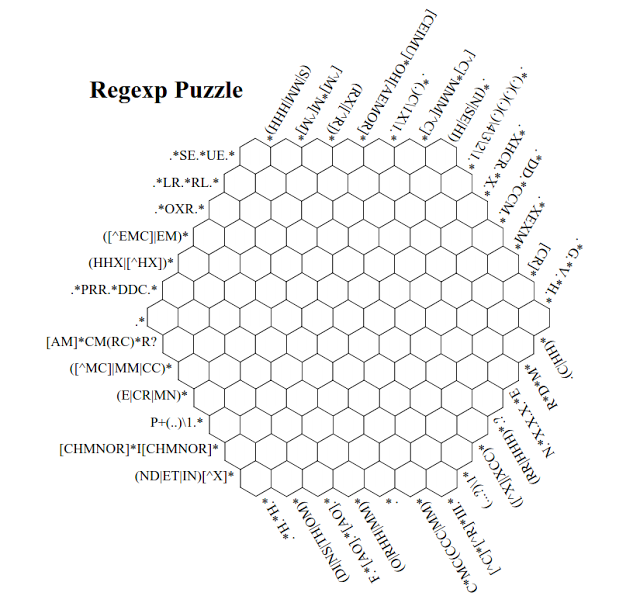Regular Expression Crossword Puzzle by Greg Grothaus.
From the post:
If you know regular expressions, you might find this to be geek fun. A friend of mine posted this, without a solution, but once I started working it, it seemed put together well enough it was likely solvable. Eventually I did solve it, but not before coding up a web interface for verifying my solution and rotating the puzzle in the browser, which I recommend using if you are going to try this out. Or just print it out.
It’s actually quite impressive of a puzzle in it’s own right. It must have taken a lot of work to create.
…
The image is a link to the interactive version with the rules.
Other regex crossword puzzle resources:
RegHex – An alternative web interface to help solve the MIT hexagonal regular expression puzzle.
Regex Crossword – Starting with a tutorial, the site offers 9 levels/types of games, concluding with five (5) hexagonal ones (only a few blocks on the first one and increasingly complex).
Regex Crosswords by Nikola Terziev – Generates regex crosswords, only squares at the moment.
In case you need help with some of the regex puzzles, you can try: Awesome Regex – A collection of regex resources.
If you are really adventuresome, try Constraint Reasoning Over Strings (2003) by Keith Golden and Wanlin Pang.
Abstract:
This paper discusses an approach to representing and reasoning about constraints over strings. We discuss how many string domains can often be concisely represented using regular languages, and how constraints over strings, and domain operations on sets of strings, can be carried out using this representation.
Each regex clue you add is a constraint on all the intersecting cells. Your first regex clue is unbounded, but every clue after that has a constraint. Wait, that’s not right! Constraints arise only when cells governed by different regexes intersect.
Anyone interested in going beyond hexagons and/or 2 dimensions?
I first saw this in a tweet by Alexis Lloyd.
